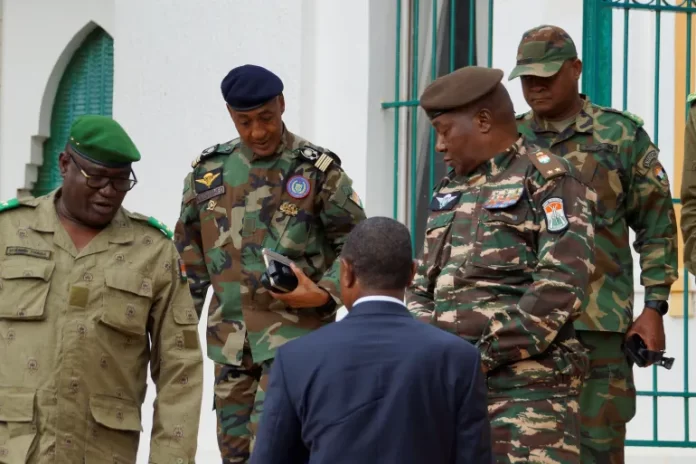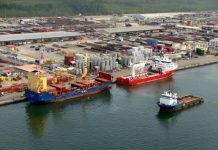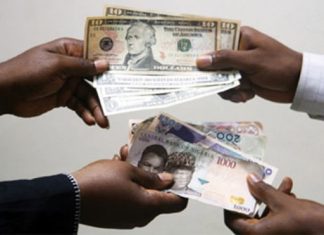Members of the Economic Community of West African States, or ECOWAS, are concerned about the recent coup in Niger and are experiencing regional tension as a result.
According to the decisions made by the ECOWAS Heads of State and Government on Tuesday in Abuja, war is imminent in the West African region.
General Abdourahamane Tchiani, the head of the presidential guard in Niger, proclaimed himself head of state on July 28 after the military seized control and toppled the elected president, Mohamed Bazoum. This sparked political unrest.
In addition to stressing that the intervention was required to prevent “the gradual and inevitable demise” of the nation, the coup plotters cited escalating insecurity and a lack of economic growth as their justifications for seizing.
As calls were made for ECOWAS, the regional economic and political organisation made up of 15 member states in West Africa, to take action and make a forceful response to the unfolding events in Niger, the news of the coup was met with outrage and condemnations on a global scale.
ECOWAS has consistently been adamantly opposed to any illegal change of government among its member states. The organisation has a long history of putting its democratic protocols into practise and ensuring the restoration of order in nations experiencing crises.
The creation of the regional peacekeeping organisation ECOMOG, which was led by Nigeria in the 1990s and early 2000s, was one of its most notable initiatives. This operation was crucial in bringing peace back to a number of nations, including Liberia, where troops were first sent in 1990 to put an end to the country’s bloody civil war. When the democratically elected government of Ahmed Tejan Kabbah was overthrown in Sierra Leone in 1997, ECOMOG’s intervention there was equally important.
ECOWAS swiftly denounced the recent coup in Niger and demanded the immediate restoration of constitutional order in the nation, in keeping with its unwavering dedication to democracy.
The ECOWAS response to the coup in Niger hasn’t been unified, though. On the one hand, ECOWAS, under the new leadership of Bola Ahmed Tinubu, the president of Nigeria, has vowed to deal harshly with the coup plotters and has imposed harsh sanctions on Niger. A no-fly zone has also been established over Niger and its military leadership as part of ECOWAS’ sanctions, which also include the closure of all Niger’s borders and the suspension of trade, diplomacy, and financial services to the nation. The ECOWAS has emphasised that it will impose additional sanctions if the Nigerian military fails to reinstate ousted President Bazoum within seven days.
However, some member nations, including Guinea, Mali, and Burkina Faso, have sided with the Niger military junta and warned against taking any kind of military action.
These two nations, where military takeovers of government had also occurred, declared support for the coup in Niger. They promised to “lend a hand to the people of Niger” to fight invaders in a joint statement on Monday. Mali and Burkina Faso issued a warning that “any military intervention against Niger would amount to a declaration of war against Burkina Faso and Mali,” according to the statement.
A Niger invasion, they added, would result in their immediate expulsion from ECOWAS and the implementation of self-defense measures in support of the Nigerian military and populace.
Mali and Burkina Faso attacked ECOWAS and its leaders, saying that they were hypocritical.
“The Transitional Governments of Burkina Faso and Mali are deeply outraged and surprised by the disparity observed between, on the one hand, the promptness and the daring attitude of some political leaders in West Africa who wish to use force armed forces to restore constitutional order in a sovereign country, and on the other hand, the inaction, indifference, and passive complicity of these organisations and political leaders in aiding States and peoples who have been subjected to oppression,”
Mali and Burkina Faso’s recent actions have been widely denounced by the international community, including the United States of America, the United Nations, and ECOWAS. Concerns have also been raised about the possible negative effects of armed conflict within the West African sub-region.
Niger’s military options are limited as time is running out. Either it can hold out hope that the ECOWAS one-week deadline will not lead to prompt action, or it can try to come to terms with the other side. Niger is vastly outnumbered and outarmed by the ECOMOG forces, though it only has about 12,000 poorly equipped military personnel. With the full backing of the US, France, and the EU, it is obvious that Niger cannot stand a chance against ECOWAS and its tenacious military forces.
Chief Femi Fani-Kayode, a former minister of aviation and leader of the ruling party, the All Progressives Congress, urged Nigeria not to back down from leading the ECOMOG forces in expelling the Niger coupists and crushing member countries that support the junta in response to the threat from Mali and Burkina Faso. His statement was posted on his verified Twitter account on Tuesday.
Mali and Burkina Faso’s military governments have declared that “any attack on the Niger Republic by ECOWAS will be regarded as an act of war.” This is a pitiful and absurd threat coming from two pitiful and absurd unelected governments led by military dictators.
The biggest error that the mutinous rebels and military usurpers of Burkina Faso, Mali, and Niger and their allies can ever make is to underestimate the fighting power and unbreakable spirit of the Nigerian military as well as the sense of unity that we as a people kindle, muster, and cultivate when confronted on the battlefield by a foreign foe.
“Our nation may face difficulties and problems, but in battles against foreign armies on foreign soil, we have never been outnumbered or beaten. History supports this. If the Burkinabe, Malian, or Nigerien Army tests our resolve, we will bring them to their knees and impart the lesson of their lives. We are slow to rage but unstoppable in battle.
Threatening the great nation of Nigeria with war is a serious matter that, if carried out, would be expensive for them. To put it simply, we would send them back to the Stone Ages, where they belong, and crush them under our feet like maggots, Fani-Kayode said.
In a statement obtained by on Tuesday, Mr. Uzogara Tobechukwu, a policy analyst, urged the ECOWAS not to be discouraged by the threats and dissension among members over the coup in Mali. The 35-year-old Burkina Faso captain Ibrahim Traore was dismissed by Tobechukwu as being no match for Nigeria.
Burkina Faso is unquestionably a weak military state, he declared, with fewer than 12,000 soldiers and a population comparable to Lagos’. Further supporting the argument that Burkina Faso lacks adequate defences is the fact that nearly 40% of the nation is controlled by raging Islamist Jihadists.
Ibrahim Traore’s threat to attack any ECOWAS force that invades the Niger Republic in order to restore its ousted President Bazoum is therefore amusing as well as insulting to all sane Africans who want to see democracy spread across the continent. It is blatantly obvious that the military president of Burkina Faso must really be a big time joker in addition to being unable to defend his own nation.
“Premier Tinubu and ECOWAS should heed my advice and not be deterred by the possibility of conflict escalation. The current moment calls for an end to the growing trend of military interventions in politics. On this, Africans must be in unison. Failure to accomplish this goal now would give people like Ibrahim Traore, Assimi Goita of Mali, and Omar Tchiani of Niger more confidence to repeat themselves in other African nations.
If ECOWAS decides to wage war to overthrow the Niger military regime, the odds are in their favour. The ECOWAS region is thought to possess more military equipment. Even though not all of its 230,000 soldiers are on the front lines, Nigeria, the leading nation in the bloc, alone has West Africa’s largest armed forces. According to Global Fire Power, a company that ranks military strength, nine of the top 20 countries in Africa with the best militaries are still-existing democracies in West Africa.
The highest-ranked of the four nations that have recently experienced coups is Mali, which is ranked 21st. Only Nigeria, which is ranked fourth, is among the top five. Even with this benefit, prominent Nigerian opinion leaders urged President Tinubu to use sanctions against Niger rather than go to war.
“ECOWAS leaders shouldn’t play into the hands of the enemies of Africa by launching a military attack on Niger since they did not invade Burkina Faso, Guinea, or Mali when power-drunk soldiers overthrew democratically elected governments.
The Nigerian government worked with Nigeria to carry out counter-insurgency operations against Islamist militancy in a region that was experiencing a security crisis. To that extent, Nigeria’s strategic and geopolitical interests must be taken into account, human rights attorney Femi Falana, SAN said at a West African Bar Association (WABA) conference in Accra, Ghana.
In addition, the founder of the Advocacy Network on Religious and Cultural Existence and award-winning journalist Odimegwu Onwumere warned Nigeria against intervening militarily in the country’s internal affairs.
“Nothing is forced! If Nigeria’s government still believes in using military force against every instigator, what qualifies that country as a democracy? Diplomacy, not force, should be used to resolve the coup situation in the Niger Republic. For once, ECOWAS should use strategy and not always follow the tunes that the West plays for her.
On top of that, no outside military force was used to enforce Nigeria’s coup. Africans should learn when to draw on their traditional knowledge and stop exclusively using Western knowledge. Keep in mind that Europe has had more than a year without starting a war with Russia or the Ukraine. Africa should rise from the ruins of the barbarians, he advised.
In a similar vein, Prof. Bolaji Akinterinwa, a well-known academic and authority on international relations, urged the ECOWAS leaders to use diplomacy and bring all the parties together in order to establish long-lasting peace in the unrest-plagued poor nation.
Akinterinwa emphasised that Nigeria currently lacks the resources necessary to wage any kind of war.
According to him, the ongoing efforts by the West and Russia to control Niger will drag Nigeria and the rest of West Africa into a conflict for which we are unprepared.
In order to further their own interests, he said, “Russia and Wagner are taking advantage of the way Western powers are making life difficult in the country.”
Join Television Nigerian Whatsapp Now
Join Television Nigerian Facebook Now
Join Television Nigerian Twitter Now
Join Television Nigerian YouTUbe Now





